Technology and the Character of Contemporary Life
A Philosophical Inquiry
ALBERT BORGMANN
THE UNIVERSITY OF CHICAGO PRESS
Chicago and London
THE UNIVERSITY OF CHICAGO PRESS, CHICAGO 60637
THE UNIVERSITY OF CHICAGO PRESS, LTD., LONDON
1984 by The University of Chicago
All rights reserved. Published 1984
Paperback edition 1987
Printed in the United States of America
06 05 04 03 02 01 00 99 98 97 5 6 7 8 9
ISBN 978-0-226-16358-1 (e-book)
LIBRARY OF CONGRESS CATALOGING IN PUBLICATION DATA
Borgmann, Albert
Technology and the character of contemporary life.
Includes bibliographical references and index.
1 TechnologyPhilosophy. I. Title
T14.B63 1984 303.4'83 84-8639
ISBN 0-226-06629-0 (paper)
 The paper used in this publication meets the minimum requirements of the American National Standard for Information SciencesPermanence of Paper for Printed Library Materials, ANSI Z39.481984.
The paper used in this publication meets the minimum requirements of the American National Standard for Information SciencesPermanence of Paper for Printed Library Materials, ANSI Z39.481984.
Contents
Acknowledgments
This book is the summary of work that has occupied me for over a decade. I have received help from many people. From John Winnie I have learned to appreciate the power of the natural sciences. Henry Bugbee taught me to affirm in my thinking what matters to me in life. Carl Mitchams friendship has been crucial to my working out a philosophy of technology. The staff, the faculty, and the administration of the University of Montana have supported my work generously. Finally, I am indebted to discussions with my students.
PART 1
The Problem of Technology
is to show how in the midst of technology we can become more conscious and confident of our focal concerns and how, against the background of technology, we can give them a central and consequential place in our lives.
These remarks must appear dubious and perhaps cryptic. They are so in part because they are brief, but partly also because they summarize views at variance with the common understanding of technology. A careful introduction is thus needed to connect the major concerns of this book with current thought on technology and to clear the ground for another way of approaching the problem of technology. This is the task of . It presents brief surveys of those two parts and, at the same time, clarifies the significance of scholarship and method for the task before us.
In , finally, develops and extends the understanding of science to include the problem of technology. It concludes that modern science is a necessary condition of modern technology and so is an understanding of one for the appreciation of the other; but science and technology are not the same thing nor essentially continuous with one another. Hence the character of technology requires an investigation and a method in its own right.
The chapters of alone, is intended to meet those requirements.
1
Technology and Theory
The advanced technological way of life is usually seen as rich in styles and opportunities, pregnant with radical innovations, and open to a promising future. The problems that beset technological societies are thought to be extrinsic to technology; they stem, supposedly, from political indecision, social injustice, or environmental constraints. I consider this a serious misreading of our situation. I propose to show that there is a characteristic and constraining pattern to the entire fabric of our lives. This pattern is visible first and most of all in the countless inconspicuous objects and procedures of daily life in a technological society. It is concrete in its manifestations, closest to our existence, and pervasive in its extent. The rise and the rule of this pattern I consider the most consequential event of the modern period. Once the pattern is explicated and seen, it sheds light on the hopes that have shaped our times, on the confusions and frustrations that we have suffered in our attempts to realize those hopes, and on the possibilities of clarifying our deepest aspirations and of acting constructively on our best insights.
Concrete, everyday life is always and, it seems, rightly taken for granted. It is the common and obvious foreground of our lives that is understood by everyone. Therefore it is almost systematically and universally skipped in philosophical and social analysis. But if the determining pattern of our lives resides and sustains itself primarily in the inconspicuous setting of our daily surroundings and activities, then the decisive force of our time inevitably escapes scrutiny and criticism. I want to argue that this is in fact so, and not only because everydayness in general seems inconsiderable but because of the particular way in which the ruling pattern of our time arose and came to be articulated.
The pattern of which I have been speaking inheres in the dominant way in which we in the modern era have been taking up with the world; and that characteristic approach to reality I call (modern) technology. Technology becomes most concrete and evident in (technological) devices, in objects such as television sets, central heating plants, automobiles, and the like. Devices therefore represent clear and accessible cases of the pattern or paradigm of modern technology. Giving these claims conviction will occupy us for much of the book. But the note of alarm in the foregoing remarks and their abstract and perhaps peremptory tone as well as the unusual focus of the perspective that they advocate make it advisable to provide an early illustration of the device paradigm. Surely a stereo set, consisting of a turntable, an amplifier, and speakers, is a technological device. Its reason for being is well understood. It is to provide music. But this simple understanding conceals the characteristic way in which music is procured by a device. After all, a group of friends who gather with their instruments to delight me on my birthday provide music too. A stereo set, however, secures music not just on a festive day but at any time, and not just competent flute and violin music but music produced by instruments of any kind or any number and at whatever level of quality. To this apparent richness and variety of technologically produced music there corresponds an extreme concealment or abstractness in the mode of its production. Records as unlabeled physical items do not bespeak, except to the most practiced of eyes, what kind of music they contain. Loudspeakers have no visible affinity to the human voice, to the brass or the strings whose sound they reproduce. I have little understanding of how the music came to be recorded on the disk and by what means it is retrieved from it. I have a vague conception at best of the musicians who originally performed the music; I may not even know how many there were, and in some cases I will not be able to distinguish or identify their instruments from the reproduction of their playing.
When we consider such a technological device and the things and practices that it replaces, varied and conflicting intuitions come to mind. What are the gains and what the losses in the rise of technologically recorded and reproduced music? If a consistent and revealing answer can be found to this question, does the finding have general significance? Is it an instance of a pervasive pattern? In the pursuit of an answer to these questions, we will have to pay attention to the sharp division between the commodious availability of music that a stereo set procures and the forbiddingly complex and inaccessible character of the apparatus on which that procurement rests. It is the division between the commodity, e.g., music, and the machinery, e.g., the mechanical and electronic apparatus of a stereo set, that is the distinctive feature of a technological device. An object that exhibits this central feature clearly is a paradigm of the technological device. I use paradigm, however, not only in the sense of clear case but also for the pattern the clear case exhibits so well; and that pattern in turn can be drawn from various points of view and at different levels of abstraction. Obviously this definition of technology conflicts with many others that have been developed. It is helpful to consider these, and I will do so in . But it is not my purpose to establish the sense of technology that I have proposed as somehow superior or privileged. What the word technology should provide for this essay is a concept, a
Next page
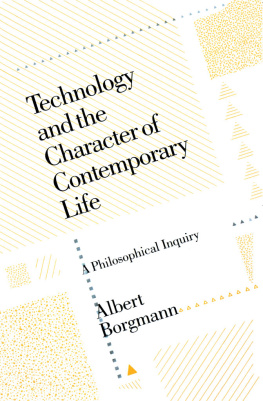
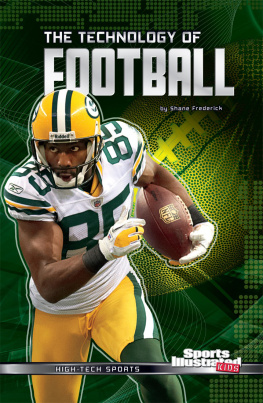

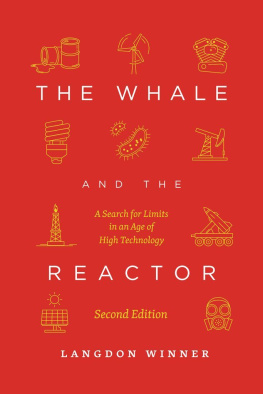
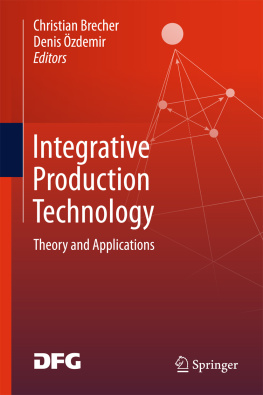
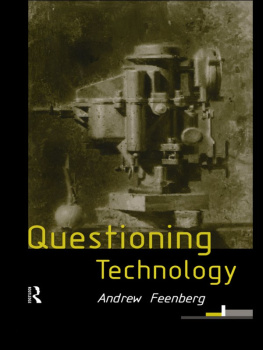

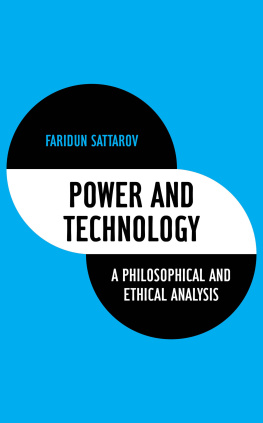
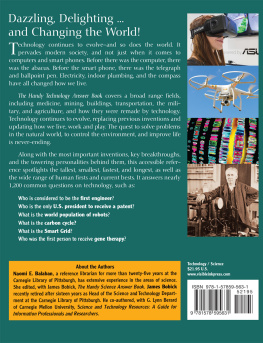
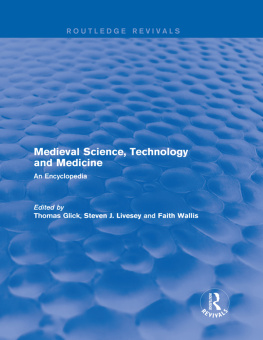
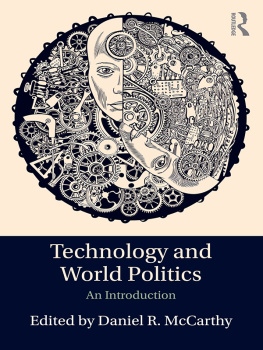
 The paper used in this publication meets the minimum requirements of the American National Standard for Information SciencesPermanence of Paper for Printed Library Materials, ANSI Z39.481984.
The paper used in this publication meets the minimum requirements of the American National Standard for Information SciencesPermanence of Paper for Printed Library Materials, ANSI Z39.481984.